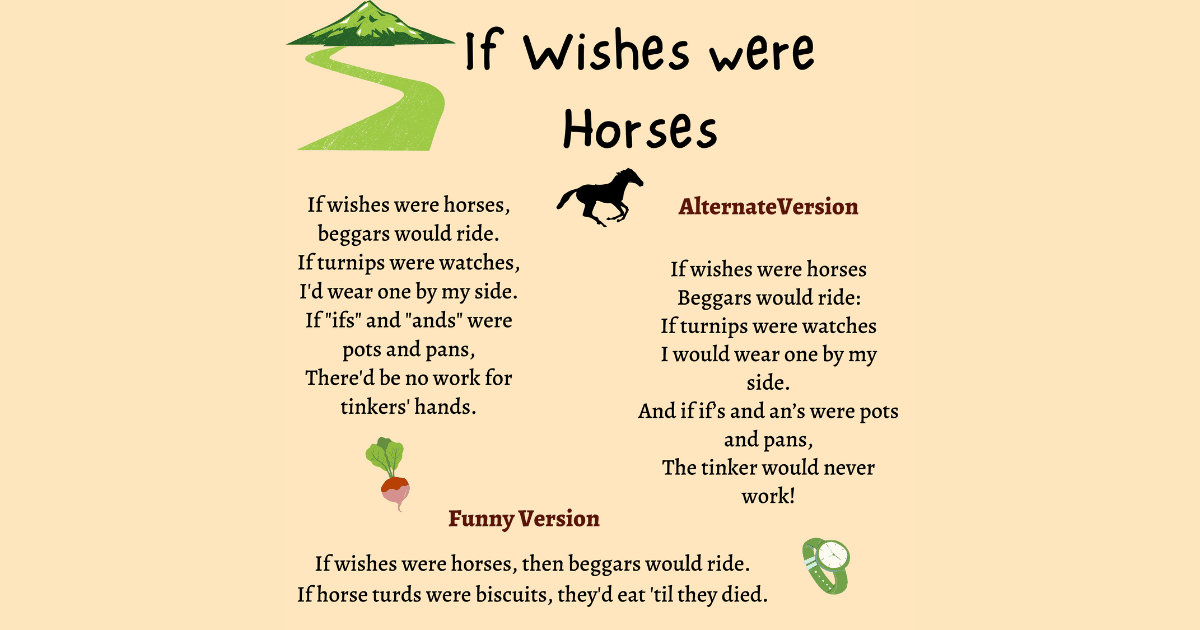If needs have been horses, exploring the complexities of this adage takes us on a journey via the realm of aspirations and realities. We’ll delve into the symbolic that means, its historic context, and the way it resonates in fashionable life.
This exploration delves into the center of the saying, analyzing the often-overlooked nuances of its software. Think about how this highly effective metaphor has been used all through historical past and throughout cultures, and the way its core message stays related in the present day. We’ll uncover the hidden truths inside this seemingly easy phrase.
We have all been there. Gazing at a seemingly unattainable dream, wishing it have been as tangible as a horse in a area. The phrase “if needs have been horses” carries a timeless weight, prompting reflection on the hole between aspiration and actuality. However what does it actually imply, and the way can we perceive its implications in our fashionable world?
Understanding the Metaphor: If Needs Have been Horses
The proverb “if needs have been horses, beggars would journey” is a timeless expression of the inherent hole between want and attainment. It highlights the truth that merely wishing for one thing would not routinely convey it into being. This is not to say that needs are unimportant, however moderately that they should be coupled with motion, planning, and a sensible understanding of the obstacles concerned.
The Energy of Want, If needs have been horses
Whereas the proverb cautions towards the futility of wishful pondering with out motion, it additionally acknowledges the profound energy of want. Our needs, whether or not giant or small, are the driving drive behind a lot of human progress. They inspire us to study, to create, and to try for betterment. Understanding the excellence between wishful pondering and motivated motion is essential for navigating the complexities of life.
The Position of Motion in Achievement
The proverb, at its core, encourages a shift in perspective. It means that whereas needs are important because the spark of motivation, they should be adopted by concrete steps to realize the specified consequence. Think about the horse; it is a highly effective image of potential, nevertheless it requires a rider, a path, and a journey. With out the rider’s effort, the horse stays static.
Bridging the Hole Between Want and Actuality
Turning needs into actuality includes a multi-faceted method. This contains cautious planning, meticulous execution, and a willingness to adapt to surprising challenges. An in depth motion plan, a practical timeline, and the power to regulate methods as wanted are essential parts within the course of.
Making use of the Proverb in Fashionable Life
The proverb “if needs have been horses” resonates deeply within the fashionable context. Whether or not aiming for a profession promotion, beginning a enterprise, or reaching a private purpose, the precept stays fixed. Our needs, whereas highly effective, should be accompanied by constant effort, resilience, and adaptableness.
Monetary Objectives and Aspirations
Think about monetary targets. Needs for monetary safety or wealth are widespread. Nonetheless, turning these needs into tangible realities requires cautious monetary planning, budgeting, and doubtlessly, vital private sacrifice. [Image: A simple graph demonstrating the correlation between effort and outcome in achieving financial goals]
Profession Development and Private Progress
Equally, profession development or private progress typically require dedication, steady studying, and networking. Merely wishing for a promotion or a talent enchancment will not routinely materialize; the mandatory steps and energy should be taken.
The Significance of Sensible Expectations
Crucially, the proverb emphasizes the necessity for real looking expectations. Some needs are merely unrealistic given present circumstances or limitations. Recognizing this distinction is important to keep away from frustration and keep a wholesome perspective.
Avoiding Disappointment and Sustaining Motivation
Unrealistic expectations can result in disappointment and a lack of motivation. By aligning needs with attainable targets, people can keep a way of progress and keep targeted on the trail to achievement.
Conclusion
The proverb “if needs have been horses” gives a worthwhile lesson in navigating the complexities of life. It encourages us to harness the facility of our needs whereas concurrently recognizing the significance of motion and real looking expectations. By understanding this delicate stability, we will try in the direction of a extra fulfilling and purposeful existence. [See also: Setting Realistic Goals and Staying Motivated]
What are your ideas on the proverb “if needs have been horses”? Share your experiences and insights within the feedback under. Share this text on social media to unfold the message!
In conclusion, the phrase “if needs have been horses” serves as a strong reminder of the hole between aspiration and achievement. Whereas we will dream of grand potentialities, success requires tangible motion and real looking planning. Finally, it encourages us to not solely dream but additionally to actively pursue our targets with a strategic and sensible method.
FAQ Abstract
What are some historic examples of “if needs have been horses” getting used?

All through historical past, the phrase has appeared in literature, poetry, and on a regular basis dialog, reflecting the human want to realize targets which will appear unrealistic within the second. Think about its use in well-known works and the way its that means developed with the occasions.
How does the idea of “if needs have been horses” relate to modern-day productiveness?
Within the fashionable world, this saying highlights the significance of setting real looking targets and growing a structured plan for reaching them. A scarcity of actionable steps can typically depart goals unrealized.
Are there any cultural variations within the interpretation of “if needs have been horses”?

Totally different cultures could have totally different interpretations, and these interpretations can mirror their distinctive values and aspirations. Discover how varied societies understand this metaphorical assertion.

